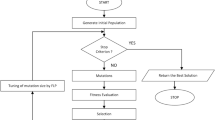Abstract
In this paper, we propose some genetic algorithms with adaptive abilities and compare with them. Crossover and mutation operators of genetic algorithms are used for constructing the adaptive abilities. All together four adaptive genetic algorithms are suggested: one uses a fuzzy logic controller improved in this paper and others employ several heuristics used in conventional studies. These algorithms can regulate the rates of crossover and mutation operators during their search process. All the algorithms are tested and analyzed in numerical examples. Finally, a best genetic algorithm is recommended.
Similar content being viewed by others
References
Bäck, T. (1992). “Self-Adaptation in Genetic Algorithms, in Toward a Practice of Autonomous Systems.” In F. J. Varela and P. Bourgine (eds.), Proceedings on 1st European Conference on Artificial Life. Cambridge, MA: MIT Press, 263–272.
Cheong, F. and R. Lai. (2000). “Constraining the Optimization of a Fuzzy Logic Controller Using an Enhanced Genetic Algorithm,” IEEE Transactions on Systems, Man, and Cybernetics-Part B: Cybernetics 30(1), 31–46.
Davis, L. (1991). Handbook of Genetic Algorithms. Van Nostrand Reinhold.
De Jong, K. A. (1975). Analysis of Behavior of a Class of Genetic Adaptive Systems, PhD Thesis, University of Michigan (University Microfilms No. 76-9381).
Eiden, A. E., R. Hinterding, and Z. Michalewicz. (1999). “Parameter Control in Evolutionary Algorithms,” IEEE Transactions on Evolutionary Computation 3(2), 124–141.
Gen, M. and R. Cheng. (2000). Genetic Algorithms and Engineering Optimization. John-Wiley & Sons.
Grefenstette, J. J. (1986). “Optimization of Control Parameters for Genetic Algorithms,” IEEE Transactions on Systems, Man, Cybernetics 16(1), 122–128.
Hoffmeister, F. and T. Bäck. (1991). “Genetic Algorithms and Evolution Strategies: Similarities and Differences.” In H. P. Schwefel and R. Männer (eds.), Parallel Problem Solving from Nature, Volume 496 of Lecture Notes in Computer Science, Dortmund (Germany), 1.-3. October 1991. Springer-Verlag, Berlin. (Proceedings of the 1st Workshop on Parallel Problem Solving from Nature (PPSN1)), 455–471.
Hong, T. P. and H. S. Wang. (1996). “A Dynamic Mutation Genetic Algorithm,”' Proceedings on the IEEE International Conference on Systems, Man, and Cybernetics 3, 2000–2005.
Hong, T. P., H. S. Wang, W. Y. Lin, and W. Y. Lee. (2002). “Evolution of Appropriate Crossover and Mutation Operators in a Genetic Process,” Applied Intelligence 16, 7–17.
Mak, K. L., Y. S. Wong, and X. X. Wang. (2000). “An Adaptive Genetic Algorithm for Manufacturing Cell Formation,” International Journal of Manufacturing Technology 16, 491–497.
Michalewicz, Z. (1994). Genetic Algorithms + Data Structures = Evolution Program, Second Extended Edition. Spring-Verlag.
Song, Y. H., G. S. Wang, P. T. Wang, and A. T. Johns. (1997). “Environmental/Economic Dispatch Using Fuzzy Logic Controlled Genetic Algorithms,” IEEE Proceedings on Generation, Transmission and Distribution 144(4), 377–382.
Srinivas, M. and L. M. Patnaik. (1994). “Adaptive Probabilities of Crossover and Mutation in Genetic Algorithms,” IEEE Transaction on Systems, Man and Cybernetics 24(4), 656–667.
Subbu, R., A. C. Sanderson, and P. P. Bonissone. (1998). “Fuzzy Logic Controlled Genetic Algorithms Versus Tuned Genetic Algorithms: an Agile Manufacturing Application,” Proceedings of the 1999 IEEE International Symposium on Intelligent Control (ISIC), 434–440.
Syswerda, G. (1991). “Schedule Optimization using Genetic Algorithms.” In L. Davis (ed.), Handbook of Genetic Algorithms. New York: Van Nostrand Reinhold, 332–349.
Wang, P. T., G. S. Wang, and Z. G. Hu. (1997). “Speeding Up the Search Process of Genetic Algorithm by Fuzzy Logic,” Proccedings of the 5th European Congress on Intelligent Techniques and Soft Computing, 665–671.
Wu, Q. H., Y. J. Cao, and J. Y. Wen. (1998). “Optimal Reactive Power Dispatch Using an Adaptive Genetic Algorithm,” Electrical Power & Energy Systems 20(8), 563–569.
Author information
Authors and Affiliations
Rights and permissions
About this article
Cite this article
Yun, Y., Gen, M. Performance Analysis of Adaptive Genetic Algorithms with Fuzzy Logic and Heuristics. Fuzzy Optimization and Decision Making 2, 161–175 (2003). https://doi.org/10.1023/A:1023499201829
Issue Date:
DOI: https://doi.org/10.1023/A:1023499201829




